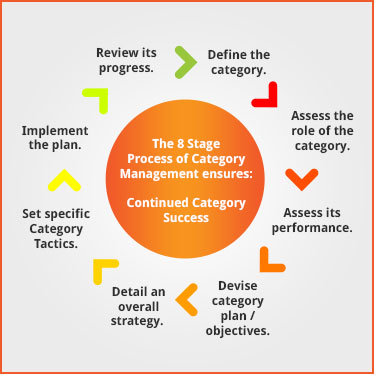Category Management
What is the definition of Category Management ?
- Category Management: ‘The strategic management of product groups through trade partnerships which aims to maximise sales and profit by satisfying consumer and shopper needs.’ IGD
- Category Management is a process to ensure the right product is in the right place in front of the right shopper at the right time driving a purchase.’ David Marston
Modern Retail Buying Teams run categories (a section in a supermarket which contains a number of brand and / or own label products, generally complimenting or competing with one another) as separate business units.
This means that each will have volume, value, profit and strategic targets.
Category Managers work to increase revenue by optimising the impact of the products within the category to the maximum number and types of shoppers.
The skill of a good category manager is to be unbiased, often designing strategies which have a positive impact on the category as a whole; thereby ensuring the supplier receives the same share but of a larger pie (category).
The Key Stakeholders in Category Management
Category Management involves a number of key stakeholders; starting with the retailer or retailer’s category, a supplier is the first stakeholder who will interact with the retailer.
From a Category Management (CatMan) perspective the supplier will provide insight from the other 2 groups of stakeholders: shoppers and consumers.
Retailers will also interact with those 2 stakeholder groups from a CatMan perspective, gathering insight, data and information which is usually sold to suppliers via third parties who will then integrate this into CatMan solutions to ensure continued Category Success.

Examples of Good Category Management.

Questions a Category Manager Should be Asking ?
A Category Manager needs to put the shopper and consumer at the centre of their category plan by asking and answering the following questions:
- How does the shopper shop ?
- When do they make their purchase decisions ?
- Why do they make their purchase decisions ?
- What factors influence their decision ?
- Who makes the decision to purchase ?
- Who is the purchase for ?
- What is the purchase used for ?
- When & Where is the purchase decision made ?
- How much is bought / would they buy ?
- What else did / would they buy ?
- Have they considered... ?
- What type of consumer are they ?
- How did they feel about the purchase experience ?

An Integral Part of Category Management is:
Shopper Marketing: ‘Understanding how one’s target consumers behave as shoppers throughout the total purchase journey, in different channels and formats, and leveraging this intelligence to the benefit of all stakeholders – brands, consumers, retailers and shoppers – at the point of purchase and through the alignment of in-store and out of store activities.’ IGD

A Category Manager Can Influence:
- Value
- Volume
- Price
- Promotions
- Layout
- Listings
- Range
- POS
- Space of Category
- Product Shares
- Retailer Shares
- Consumer Choice
- Packaging
- Displays
- Retailers and / or Suppliers Margin
- ATL and BTL Adverts
- Supply Chain